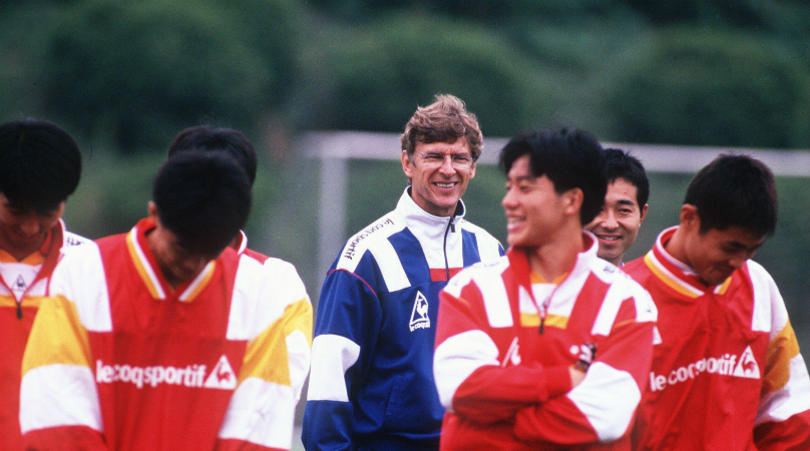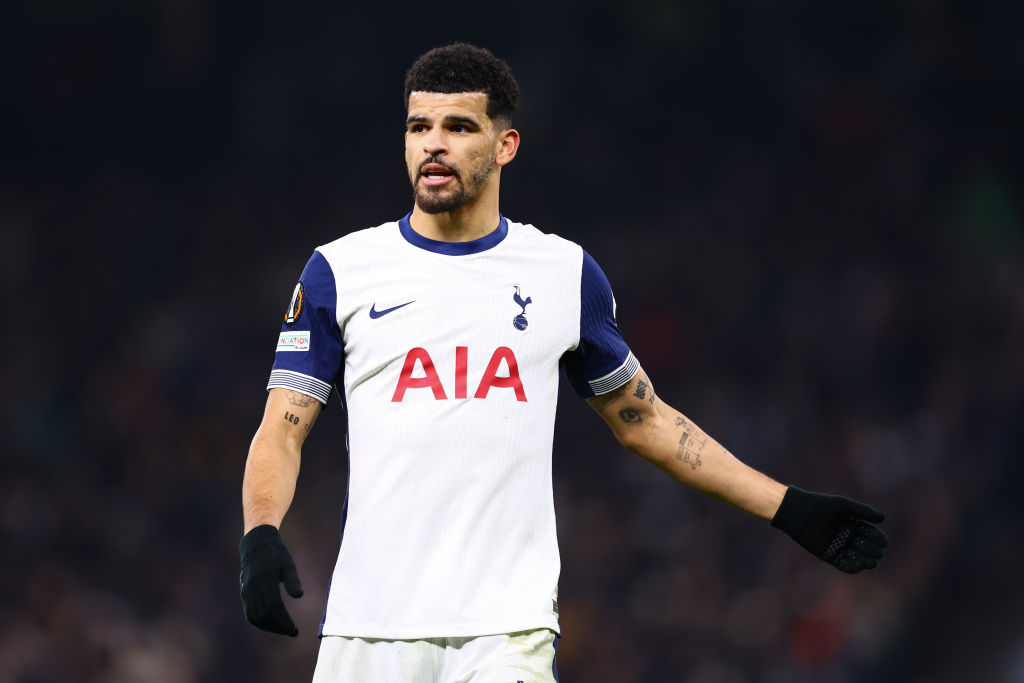The making of Mohamed Salah: “At no stage did I believe I didn’t belong at this level. Absolutely not”
The Egyptian has been making up for lost time since returning to England’s top flight, making sure Reds’ fans haven't missed Philippe Coutinho. Little wonder he’s been crowned the King of the Kop...
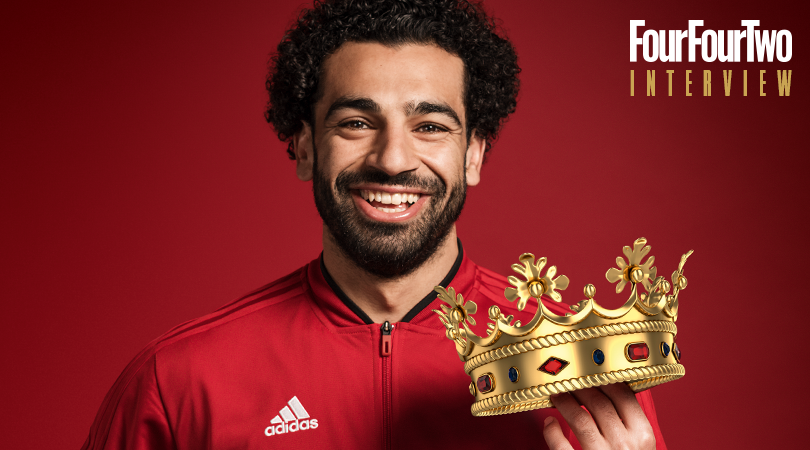
Mohamed Salah looks up and notices a football hurtling unexpectedly towards him. He immediately adjusts his body weight onto his tiptoes and kills it dead with his left foot. He lifts his head, with its mop of curls, already scouting his next move. A stunned silence greets the Liverpool winger’s outrageous first touch.
A second football is fired into Salah’s path. Again he moves adroitly to control it in an instant, and again the Egyptian star considers his options. Instead of hushed amazement this time, however, the gathered throng rises in delirious rapture.
Why the differing reactions? The latter prefaced Salah firing Liverpool 4-1 up against Manchester City, chipping keeper Ederson 68 minutes into the Reds’ win against the unbeaten Premier League leaders and sending 50,000 febrile fans into ecstasy at Anfield. The former had taken place 48 hours earlier – on a biting mid-January morning in front of no more than a dozen people – as Salah entered the 1980s chandelier-lined Sapphire Suite at Stockport County’s near-empty Edgeley Park for his debut FourFourTwo cover shoot.
FFT’s exclusive aperitif to the main course that would be served up two days later showcased his instinct. In full flow he barely thinks – he just ‘does’. Everything comes naturally to Mohamed Salah in 2018.
Harder times
Three-and-a-half years ago, though, Salah’s situation in English football couldn’t have been more different. A shot 40 minutes into a 2-1 League Cup fourth-round win at Shrewsbury Town summed up the Egyptian’s Chelsea spell. Bereft of game time under Jose Mourinho, Salah attempted a shot on goal after cutting inside from the right wing onto his favoured left foot. It went out for a throw-in.
That goal against Man City was Salah 2.0’s 24th in all competitions in 2017/18, only six months after his return to the Premier League, having excelled at Fiorentina and Roma in Serie A. His £37 million transfer has clearly been the bargain of the summer. Recently voted PFA Player of the Year and likely heading for a Champions League final, his form has been such that Philippe Coutinho’s departure to Barcelona has barely affected Liverpool.
Get FourFourTwo Newsletter
The best features, fun and footballing quizzes, straight to your inbox every week.
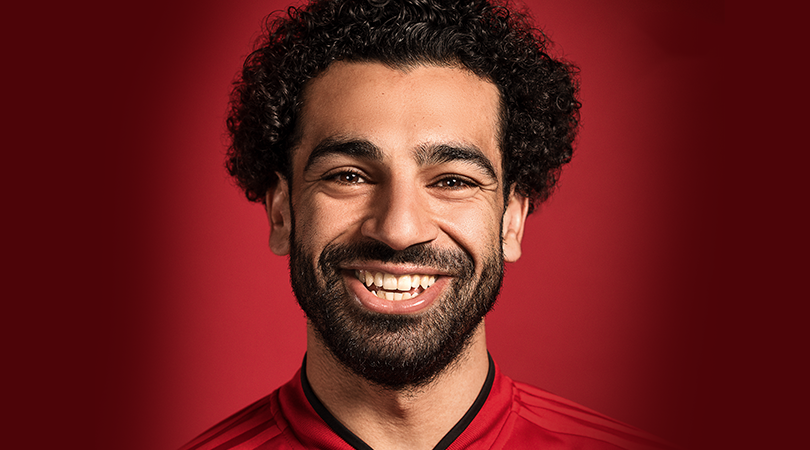
Pictures taken, errant footballs controlled and kick-ups completed back in Stockport, a smiling Salah is raring to sit down for his maiden major newspaper or magazine interview.
There’s plenty to discuss with a player about whom so little is known, relatively speaking. Unfinished Premier League business, Jurgen Klopp on an average day, Egypt’s first World Cup for 28 years and the pressure of succeeding Coutinho as Liverpool’s new king of the Kop are all on the agenda.
Just how good is Mo Salah? And just how good does Mo Salah think he is?
The beginning
It’s 2008 and El Mokawloon Under-16s have just seen off ENPPI 4-0 in the Cairo Youth League. Despite the Mountain Wolves’ handsome victory, their left-back sits in the corner of the dressing room on the verge of tears.
Five times the teenager had dribbled from defence through the opposition to go one-on-one with the ENPPI keeper. Five times, shattered by his attacking exertions, he failed to score. Coach Said El-Shishini did two things. First, he gave the 15-year-old 25 Egyptian pounds to make him feel better. Second, he resolved never to play Mo Salah as a left-back again. If the promising defender’s starting position was further forward, the coach reasoned, he wouldn’t be too tired to apply the finishing touch by the time he reached the box. Salah would now play on the right wing.
“I told him that he would be the team’s top goalscorer in both leagues, the Under-16 Cairo League as well as the Under-17 Nationwide League,” El-Shishini, who managed the two sides, later recalled. “By the end of that season Salah had scored 35 goals combined, and since then he has never stopped scoring.”
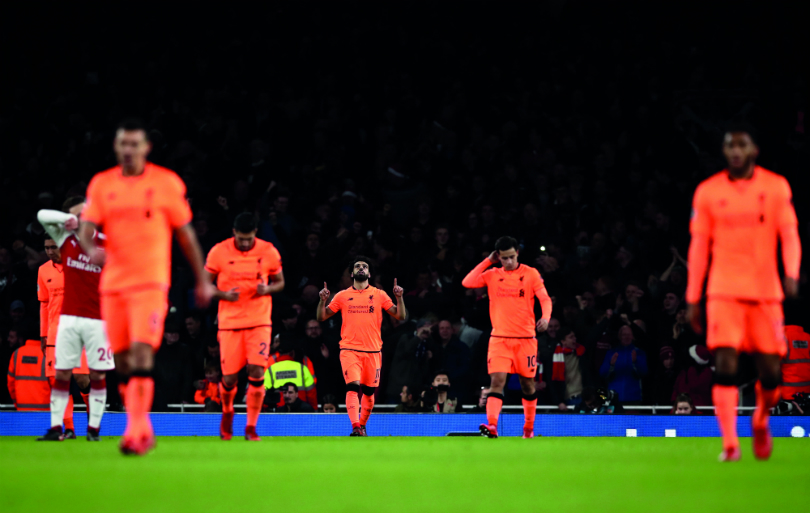
Born in Nagrig – a farming village in vast, green open spaces 100 miles north of the capital – Salah has seldom been without a football. His cousin Abadah Saeed Ghali, who still lives in the village, remembers a “soccer addict” forever zipping around Nagrig with a ball in tow.
“I played out on the street with my brother and friends until I was about 14 years old,” Salah tells FFT, his keepie-uppie session with our photographer now concluded. “My earliest football memory was watching the Champions League matches. I always loved watching [Zinedine] Zidane, [Francesco] Totti and the Brazilian Ronaldo. It’s an amazing feeling when you hear that music now before kick-off.”
Inspired by the greats he would tune in to watch – one of whom, Totti, would later become a Roma team-mate – football became Salah’s life. In 2006, El Mokawloon, one of Cairo’s most prominent clubs with a history of producing promising talent (and also known as Arab Contractors), had heard about the little speedster in the Basyoun farming heartlands.
“That's when my career as a professional footballer really started,” explains Salah, who had been playing for amateur teams near Nagrig and Tanta, a larger town 90 minutes down the road. “Arab Contractors was four-and-a-half hours away on three or four buses to Cairo – a trip I had to make there and back five days a week.
“I missed quite a lot of school because it was the only way that I could get to training on time. Sometimes I’d spend just two hours at school from 7am until 9am and then have to leave. Becoming a footballer was always my dream – when we’re young, we dream a lot.”
Daydream believer
Dream soon became reality. Freed from his left-back shackles, Salah evolved into one of El Mokawloon and Egypt’s most promising talents. He made his debut in May 2010 by coming off the substitutes’ bench in a 1-1 draw with El Mansoura.
“I was 16 years old and it felt great,” says Salah, beaming ever more with pride. “I was also surrounded by good players who had a lot more experience, and I felt protected by them.”
Within two years, Salah had made his full debut for Egypt, but his life changed during a March 2012 friendly with the Pharaohs’ under-23s, against Basel. Arranged in the build-up to that summer’s Olympics, after domestic football was halted in the aftermath of the Port Said Stadium disaster that February, Salah came off the bench at half-time and scored twice in a 4-3 victory against the Swiss side which featured Xherdan Shaqiri, Fabian Frei and Valentin Stocker.
Already on Basel’s radar, Salah was offered a week’s trial and penned a four-year contract shortly before guiding Egypt to the last eight at the London Olympics, netting against Brazil, New Zealand and Belarus.
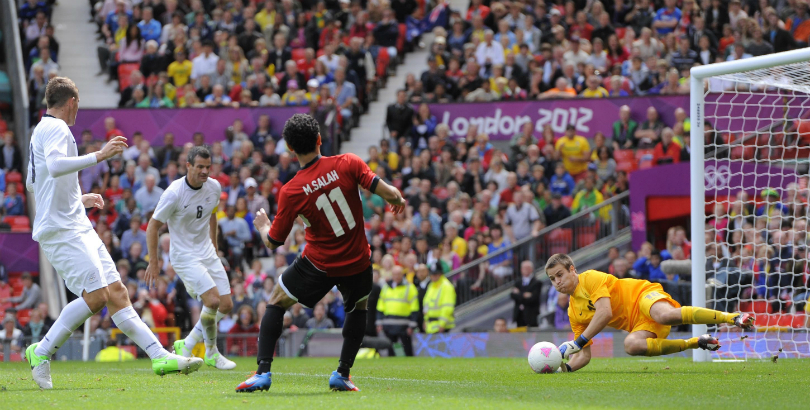
Salah’s early months in Switzerland proved a challenge. Alone in Basel, and unable to speak English or Swiss German, the diminutive winger filled his days after training walking the city streets before returning to his hotel. Determined to make a success of his European adventure, however, his iron will came to the fore. Behind the ever-present smile, there’s a single-minded focus to everything Salah does. You will never get him to do anything he doesn’t want to do.
Helped by the January 2013 arrival of compatriot and future Arsenal midfielder Mohamed Elneny, Salah grew into his opening Basel season. He scored to knock Spurs out of the Europa League at the last-eight stage and found the net again in defeat to Chelsea in the semi-finals, before the Rotblau won their expected Swiss title.
When he scored in home-and-away victories against the Blues in the following season’s Champions League group stage – a calm sidefoot past Petr Cech and a dink over the onrushing goalkeeper, both eerily similar to the goals that have so defined Liverpool’s current campaign – Stamford Bridge wolves circled. In January 2014, barely 18 months after Salah had arrived in Switzerland, Jose Mourinho forked out more than £11m to take him to London.
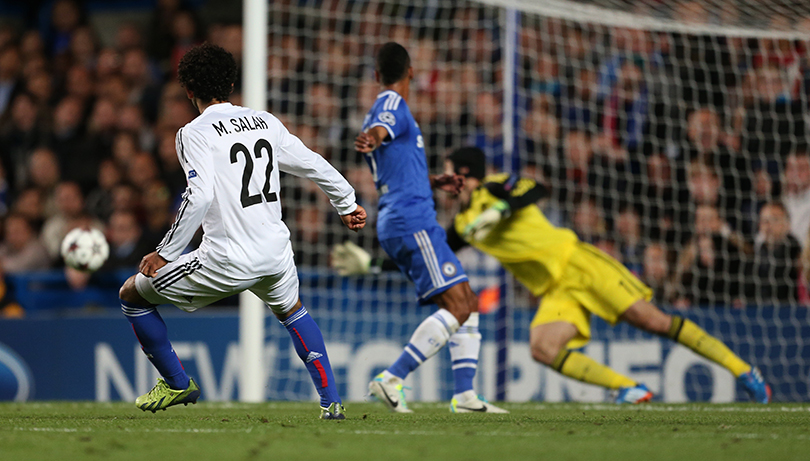
Featuring primarily from the bench, Salah adapted well to start with, scoring in March's 6-0 mauling of Arsenal before picking up a pair of man-of-the-match awards against Stoke and Swansea.
His personal highlight from that first Chelsea season, however, would come at his future home. In playing an hour as the Blues – assisted by that infamous Steven Gerrard slip on the stroke of half-time – defeated title-chasing Liverpool 2-0 in a classic Mourinho defensive masterclass, Salah completed a long-held ambition.
“Ever since I was a kid, I'd been a Liverpool fan, they were my favourite Premier League club,” he says.
“It was so special for me to play at Anfield, and the atmosphere was amazing that day. I remember thinking to myself that it would be a special place to play.”
Suffering the Blues
But if Salah thought it would prove a springboard to success, he was mistaken. Before that League Cup tie against Shrewsbury in October 2014, he had played just 18 minutes of Premier League football. It was little wonder that, despite teeing up the 48th-minute opening goal for Didier Drogba, the Egyptian struggled to find any rhythm and skewed that earlier shot horribly wide.
“I expect people who aren’t playing a lot to raise the level to create problems,” said a merciless Mourinho at full-time, clearly irked that his second-string had laboured to a 2-1 win in Shropshire. “It’s too easy to choose my team for Saturday.”
When pushed if he meant Salah and Andre Schurrle specifically, the Portuguese simply shrugged: “Yeah.”
Aside from a Champions League dead rubber against Sporting and FA Cup loss to Bradford City, it was Salah’s final Chelsea start.
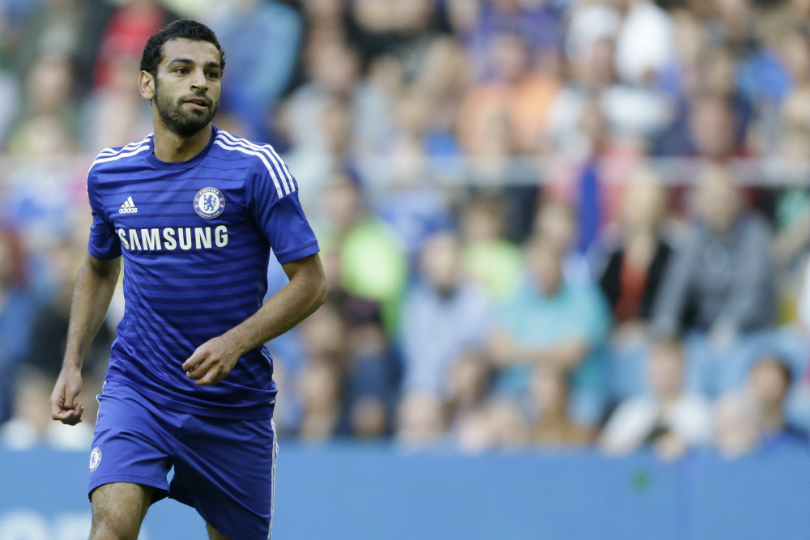
“He didn’t get a chance at Chelsea – maybe because of the manager or the other players? I don’t know,” Eden Hazard said earlier this year. “In that period I remember we had me, Willian and Oscar, so for him it wasn't easy. But he’s a top player, for sure. In training we'd do everything. Even in the games sometimes he would score goals, so we knew the quality he had.”
In January 2015, after a year at Stamford Bridge, Salah departed for Fiorentina on loan, seemingly destined to be another Romelu Lukaku or Kevin De Bruyne – talented, technical players, discarded too quickly.
“We talked at Chelsea when I first came back from the loan spell at Fiorentina,” says Salah of Mourinho. “We also spoke after the match against Manchester United this season and have a good relationship. We didn’t talk much, but it was OK.”
Did he say why you didn’t play much under him at Chelsea? “No,” he immediately retorts, his eyes never deviating from FFT for an instant. “We didn’t talk about that.”
Idolised in Italy
Serie A proved the making of Salah. Still to fill out fully, the wideman bulked up in anticipation of Italian football’s heavy-duty defending – and the results were striking.
“It was very important to get back playing football,” says Salah. “It was a good feeling to play regularly again. I felt I did pretty well in that loan spell and enjoyed my time on the field. At no stage did I believe I didn’t belong at this level. Absolutely not.”
Salah scored nine goals in 26 appearances in all competitions for the Viola, none better than the solo run from inside his own half during the 2015 Coppa Italia semi-final first leg against Juventus. This was pure Salah: searing speed allied with close control and a calm finish after trusting his instinct to break. It was, enthused sporting director Daniele Prade, “a crazy goal... the kind of thing you do when you’re a kid.”
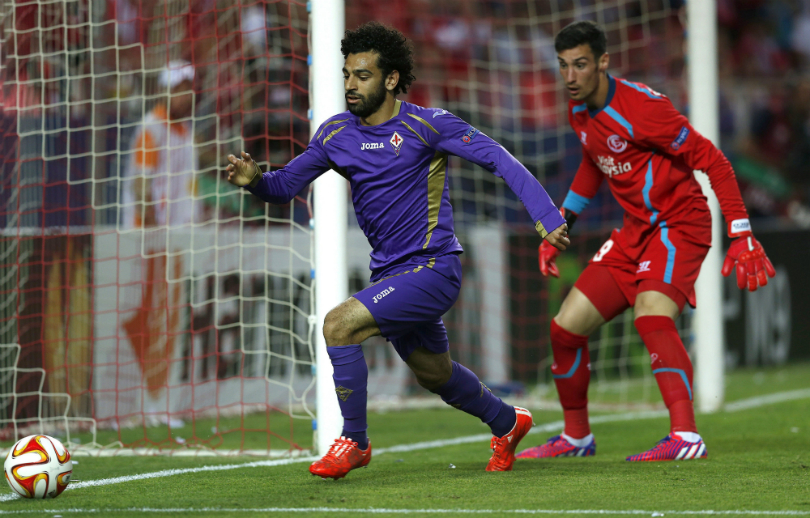
Gazzetta dello Sport was even more effusive in its praise. “Sim Salah bis,” yelled the front cover – the catchphrase of turbaned character Hadji in the ’60s American cartoon Jonny Quest, which means ‘abracadabra’. Magic, indeed.
“We knew what his attributes were, but frankly we didn’t realise he could be so decisive,” said coach Vincenzo Montella. “We knew he was one of the fastest players with the ball at his feet – perhaps only Lionel Messi is faster.”
Such speed seduced Roma boss Luciano Spalletti. Signed initially on loan in the summer of 2015, then permanently 12 months later, Salah excelled for the Giallorossi, scoring 29 goals in 65 Serie A encounters across two seasons. He also chipped in with 17 assists. In 2015/16 he was voted Roma’s player of the season and even pegged as a 10-second 100-metre runner, based on a 70m sprint against former club Fiorentina last term. “Who can catch him?” Spalletti wondered aloud as the 2016/17 campaign came to a close. “You’d need a motorbike.”
Roma’s verve reflected Salah’s own. In both of the Egyptian’s seasons at the Stadio Olimpico, the Giallorossi were among Serie A’s leading scorers. Spalletti’s high press, ruthless counter-attacking and tactical flexibility were an exhilarating antidote to Juventus’s dour domination.
“Every team I’ve played for has attacked, so it wasn’t really that strange,” explains Salah, scratching his immaculately groomed designer stubble. “Spalletti helped me improve both tactically and defensively. He would regularly stay behind after training to speak to me about these things.”
There's a warmth to what Salah recalls about the lengths to which Spalletti went to help him. The subtext isn’t difficult to spot.
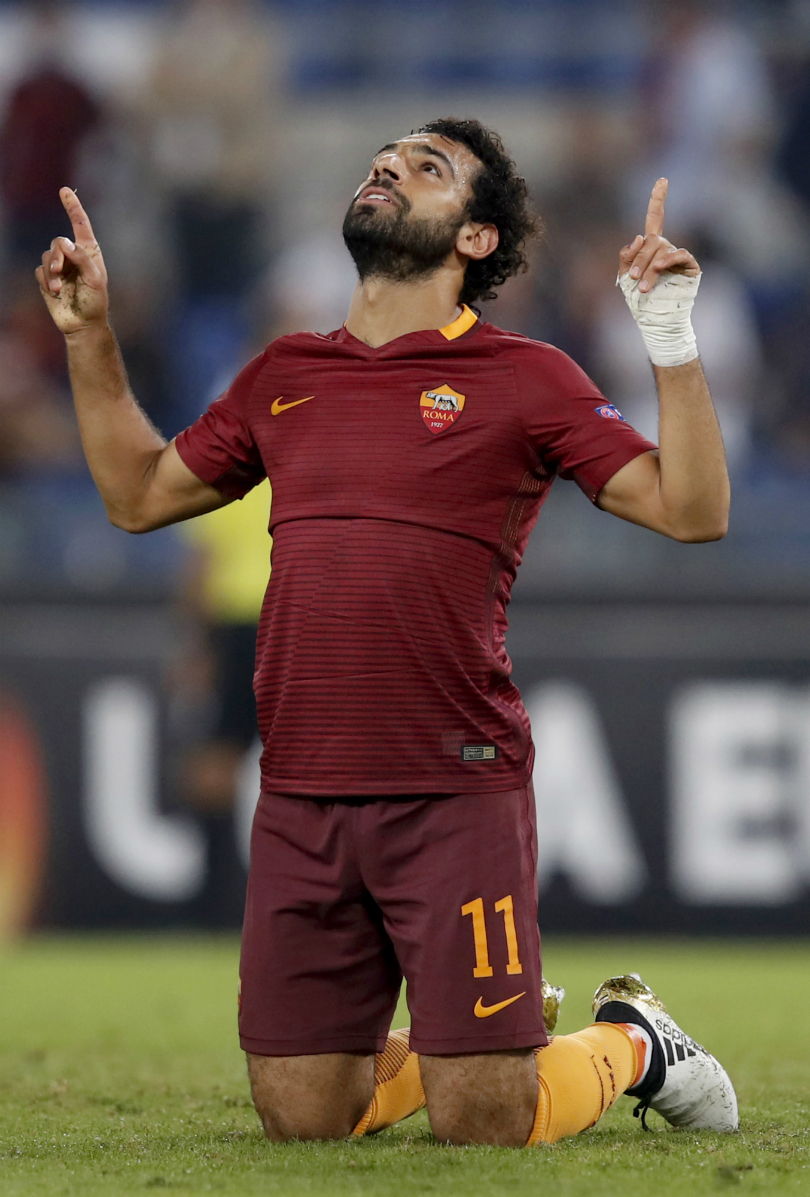
A player evolving
The speedster’s stellar improvement hadn't gone unnoticed on Merseyside. Many baulked at the club-record fee, but only those unaware of the rapidly maturing 25-year-old’s Italian form.
The man himself couldn’t wait to get started. “I've loved the club since I was young and knew this was a team I wanted to play for,” admits Salah, shaking his head in disbelief, even six months into a burgeoning Anfield career, that he’s a Liverpool player. He can’t sit still in recalling the early moments to FFT. “I knew the history that this club has and, as soon as I got the chance, I had to make it happen.”
Jurgen Klopp, having had Salah on his radar for six months, has been instrumental to Salah’s development. After the deal was done in late June last year, the forward had a full pre-season to adapt to the up-tempo style. Klopp admitted after an early friendly at Wigan that Salah “had absolutely no idea how we defend” because he had only trained twice with his new team.
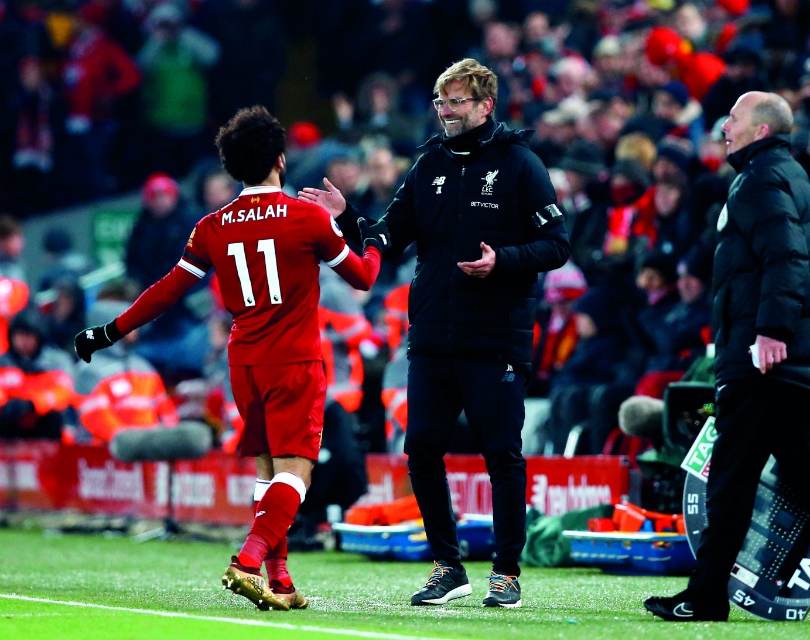
“The boss has given me the chance to improve and show the world my football – that made up my mind to come here,” says Salah. “Is he the same every day as he is on the touchline? Yeah, definitely.
“He always wants to do his best for the team, to make everyone smile and be happy, which means every player wants to give 100 per cent for him. That’s what he gives us. He’s always so motivated and wants to help each player in his squad improve.”
Further motivation came from a lingering sense of unfinished Premier League business. “Three years ago I didn’t play much, but since day one back in England I wanted to show what I can do. I think I’m doing well.”
The Reds’ No.11 says this with a knowing tone, the hint of a smile forming in the corner of his mouth. However, he is quick to point out his fuel is not to prove anyone wrong.
“I don’t want to show anyone anything,” he says. “I went to Fiorentina and went to Roma, and did very well. I came here to be at a top club and to enjoy myself – that was my thinking. Nothing else.”
Salah has certainly been enjoying himself. The beaming smile, which accompanied each pose in front of the FFT cameras, is proof of that. “Manchester City are worried,” our remarkably prescient snapper had said during the Egyptian’s shoot to elicit an even wider grin.
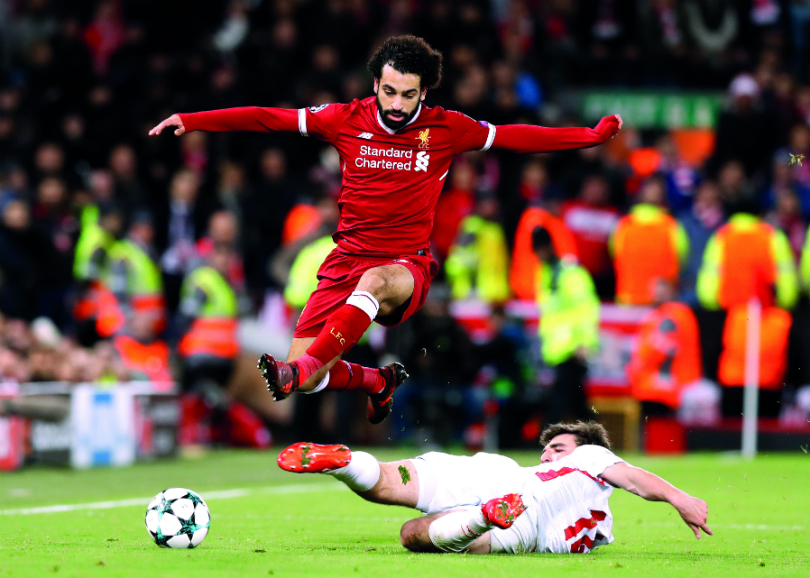
Watch back any Liverpool match this season and two things strike you. First, Salah demands the ball constantly. Whenever the Liverpool midfield or defence have possession, he'll check his shoulder, turn the palm of his hand to face the sky and point his fingers down to his feet. Give. Me. The. Ball.
Second, and even more important, is Salah's economy of movement. He rarely moves more than he needs to, whether in defence or attack. Learned from those early El Mokawloon days at left-back, he remains fresh throughout 90 minutes to seize his moment to decide a match. So efficient are Salah's movements, he is the sole Liverpool attacker whom Klopp does not rotate. “He gets angry at me when I take him off after 65 minutes or so,” the German gaffer has admitted. “That is the mentality you need.”
An instinctive relationship has flourished with his partners in crime, Roberto Firmino and Sadio Mané. The trio have scored 88 of the Reds’ 128 goals this season in all competitions.
“They’re both top players, but so are [Alex] Oxlade-Chamberlain, [Jordan] Henderson and everyone who plays near my position,” says Salah, sketching lines in the air. “We know each other so well because of the training every day, so when it comes to a match they make it easy for me. Actually, we all make it easy for each other. We’re all very happy together, want to improve and have the best season we can.”
This has comfortably been Salah’s best ever campaign as a professional. Before 2017/18, he'd never scored more than 20 goals in a season – a figure he reached by December. And the sheer variety of goals he has scored has been breathtaking.
The diamond point
Finishing off the ‘heavy metal’ counter-attacks so associated with a Jurgen Klopp team – goals against Arsenal, Stoke and West Ham particularly stand out, his first against former club Roma even more so – are all well and good, but they've been supplemented by stunning long-range strikes against Southampton and Everton at Anfield. Cutting inside from the right wing onto his wand-like left peg, the Egyptian's shots have so much power and precision that they are simply well-struck side-foots.
Then there's his winner in December’s 2-1 win against Leicester. Harry Maguire couldn't be any tighter as the ball's slipped into Salah’s feet. He controls it, turns and brushes off the England defender before rifling into the bottom corner. Such strength is a new addition to the Salah armoury. Compare photographs of him at Chelsea and he's now much stockier, with a gait reminiscent of another lightning left-footed playmaker who plies his trade in Spain. The ‘Egyptian Messi’ nickname is no longer fanciful.
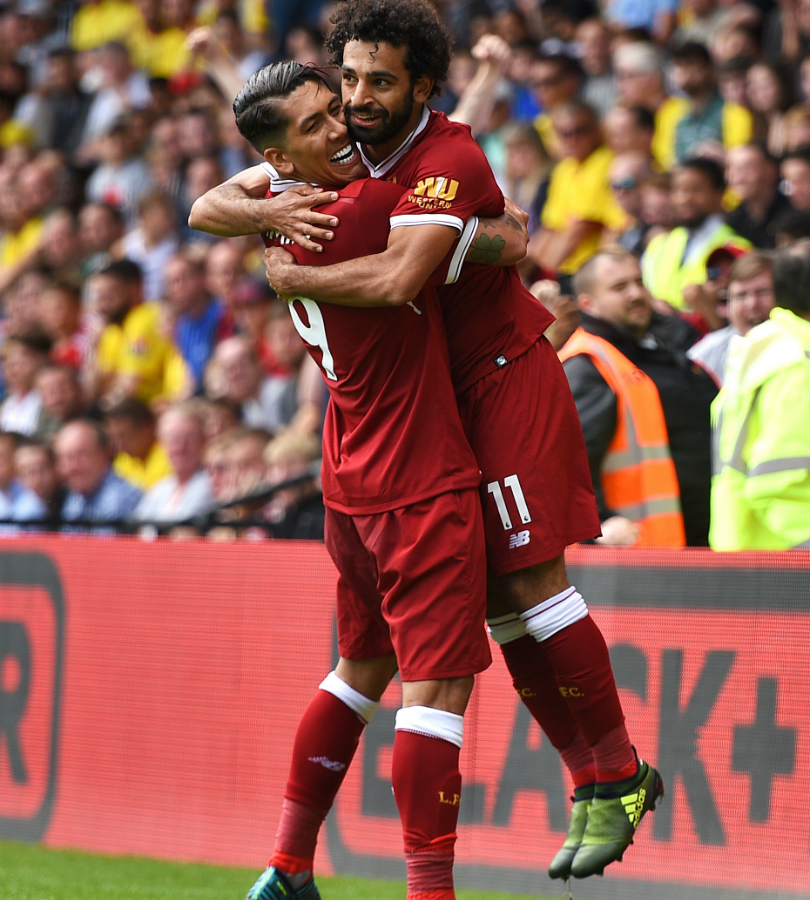
“I’d like to show you all the scouting footage we had,” revealed Klopp after that Leicester victory. “A goal like this was not involved. He is so physically strong. One hundred per cent I’m surprised by his impact.”
Did Salah himself expect to have scored quite as many goals as he has? “I don’t want to sound arrogant but, yeah,” he laughs, resembling a boxer displaying his confidence for the world to see at the weigh-in. He adjusts his weight in his seat to tilt back his head.
“Come on, I know I’m good! I was comfortable at Roma, I had two great seasons there and I was very happy, but I’ve always been the sort of guy who takes a chance, to put myself under pressure.”
Egyptian king
It's not just at Liverpool where the responsibility of being the main man rests on Salah’s shoulders. This summer, he carries the hopes of a nation into the World Cup finals, after his 94th-minute spot-kick against Congo in October sent Egypt to the tournament for the first time in 28 years.
“It’s great,” he smiles, looking ahead to Russia where the Pharaohs face the hosts, Uruguay and Saudi Arabia in June. “I’m so proud every time I pull on the Egypt shirt. When I step on the pitch I play to make people happy, whether that's for Liverpool or Egypt, but the flag and people of my country will always hold a special place in my heart.”
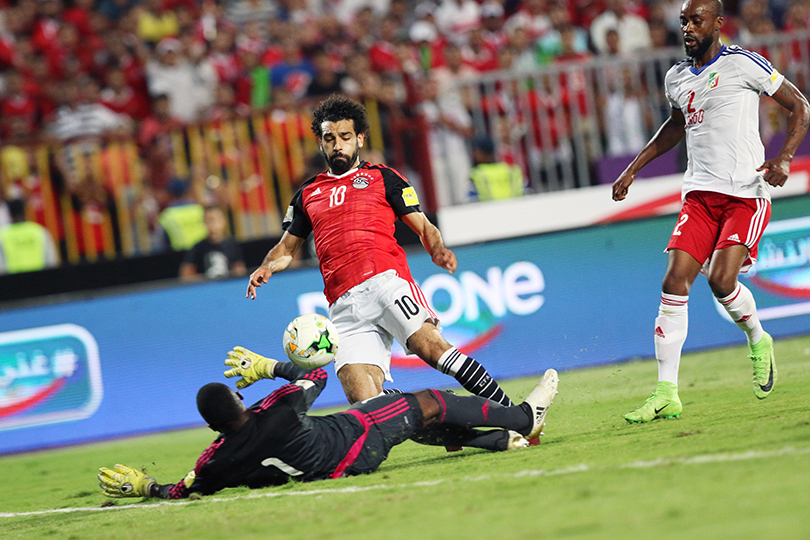
Salah’s fame extends beyond just Egypt. Voted African Player of the Year in January, he is a standard-bearer not only for the continent, but also the entire Arab world. The newspaper Al-Watan dedicated nine pages of its 16-page New Year's Day edition to the Liverpool forward, under the headline: “The Pharaoh: Joy of 2017 and hope of 2018.”
Salah pulls at Egyptians' heartstrings like no player since Mohamed Aboutrika, an attacking midfielder who won three Africa Cup of Nations titles and is generally regarded as the country's greatest ever player. When Roma visited Dubai for a warm-weather winter break in January last year, it was Salah – not Roman god Francesco Totti – who received the most adulation. It's no surprise that, when offered a week in an Egyptian businessman’s luxury villa after securing World Cup qualification for his nation, Salah instead asked for a sizeable donation to Nagrig community projects.
“I respect him a lot,” Mané said after the Senegalese winger came second to his Liverpool team-mate in the African Player of the Year vote. “And it’s not just me. You can ask my team-mates, too. Many footballers have multiple personalities. Mo's not like that. He's truly religious, he truly loves people, and the fact he's a good footballer makes it even better.”
Does Salah want to be seen as the best player in Egyptian football history? “Of course, yes!” comes the excitable, unequivocal reply. “We want to do our best at the World Cup. I don’t want to define what represents a good tournament, but we want to enjoy ourselves and we’ll see what happens.”
Before this summer, though, there's a Liverpool season to finish. Klopp's side will take a 5-2 advantage to Rome for the second leg of their Champions League final and, in all likelihood, a final against Real Madrid in Kiev will await.
“I’ve said before that we want to push ourselves to win something,” explains Salah. “For us, for the fans and for the club. That is and always will be our target. A trophy.”
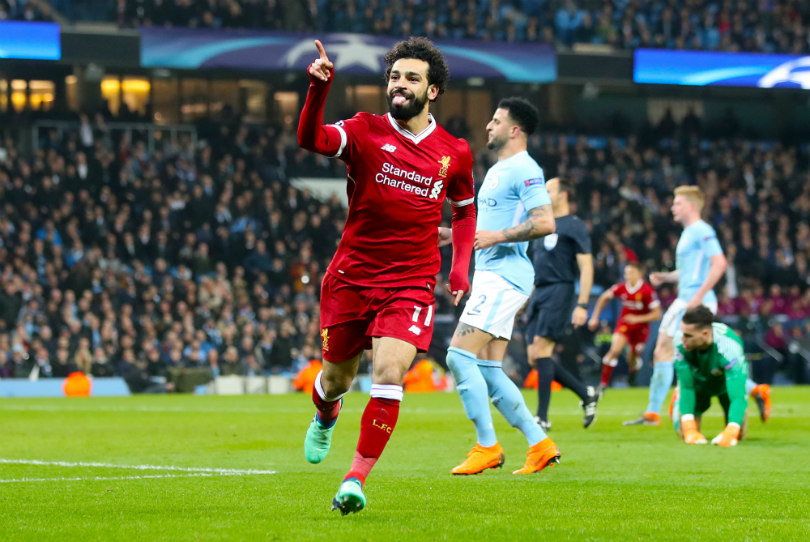
Silverware. It's what motivates every elite footballer and Salah is certainly no different. If he leads Liverpool to their first trophy since the 2012 League Cup – or helps end their 28-year wait for a league title – the Egyptian King about whom the Kop sing with increasing fervour to James’s 1990 hit Sit Down will have earned his ascension to the Reds' throne.
So is the man who an hour earlier posed up a treat with a toy crown already the new King of the Kop?
“I don’t know if it’s up to me to say that, so maybe I’ll let the fans say that,” laughs Salah, faintly embarrassed. “I’m happy scoring goals for the club I supported as a kid – that’s all that matters.”
With that, Salah bids us a good day, bobbing to the Edgeley Park exit with a cheery “Thank you”. A Mercedes – not the bus he once used in Nagrig – awaits to transport Salah the 40 miles to training at Melwood. There are so many more journies to come.
The original version of this feature appeared in the March 2018 issue of FourFourTwo. Subscribe!
Andrew Murray is a freelance journalist, who regularly contributes to both the FourFourTwo magazine and website. Formerly a senior staff writer at FFT and a fluent Spanish speaker, he has interviewed major names such as Virgil van Dijk, Mohamed Salah, Sergio Aguero and Xavi. He was also named PPA New Consumer Journalist of the Year 2015.
